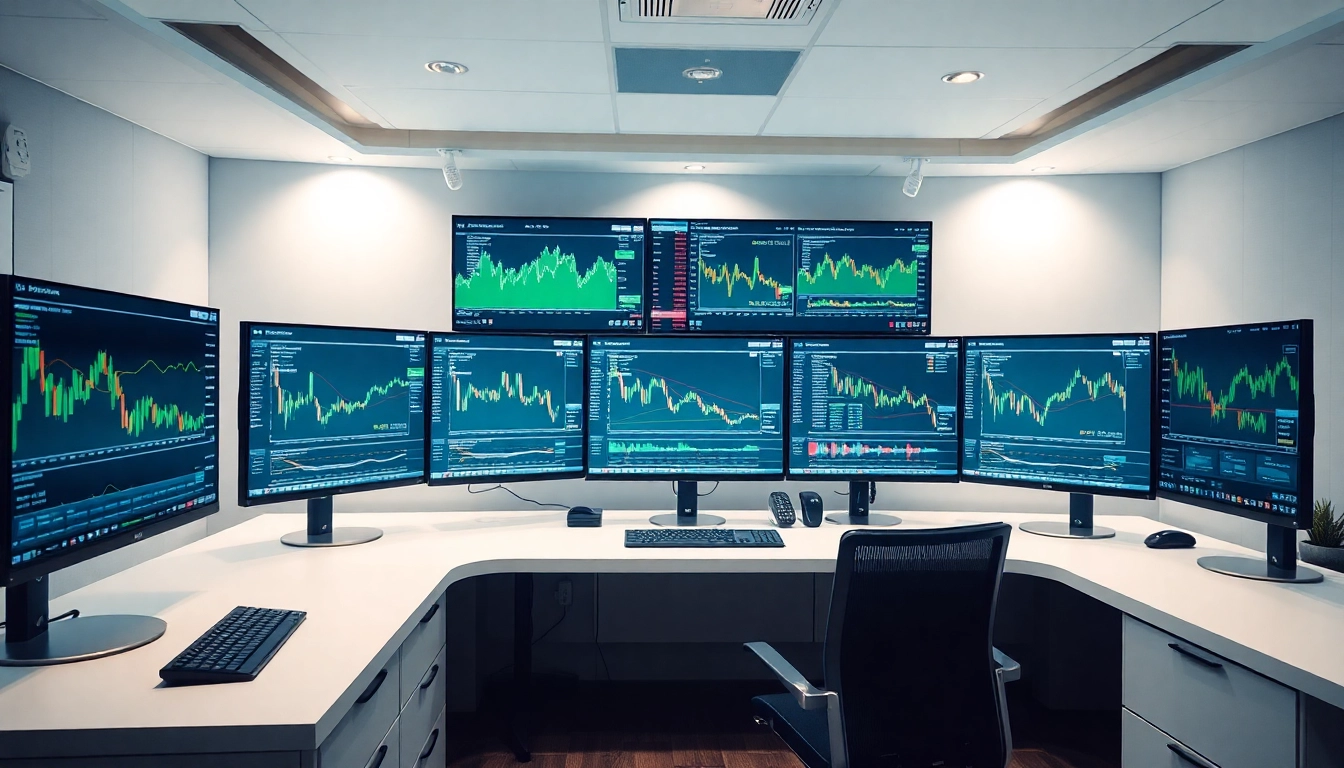Understanding the Current Landscape of UK Commodities Investment
The UK commodities market continues to reflect a complex interplay of global economic dynamics, geopolitical developments, and shifting investor sentiments. Recent market movements reveal a nuanced picture where traditional safe-haven assets like gold are reaching new heights, while volatile energy prices such as oil experience fluctuations driven by geopolitical tensions and macroeconomic data. For investors, staying informed on these trends is paramount, especially as the evolving landscape presents both risks and opportunities. To stay ahead, engaging with comprehensive sources like UK Commodities Investment News offers valuable insights into current market shifts and strategies.
Global Economic Factors Influencing UK Commodities
The UK commodities sector is inherently linked to a variety of international economic factors. The recent drop in the US dollar, driven by market expectations of potential Federal Reserve rate cuts, has had immediate implications for commodity prices. A weaker dollar traditionally makes commodities priced in USD more attractive to global investors, boosting gold and oil prices. Conversely, persistent inflation concerns within the US compel policymakers to consider aggressive monetary tightening, which can dampen commodity demand.
Furthermore, global geopolitical tensions—such as US-China trade relations, OPEC decisions on oil supply, and sanctions targeting key commodity-producing nations—continue to influence supply-demand balances. For instance, disruptions in Russian crude exports or China’s economic performance heavily sway oil and metals markets. Recent data shows that despite rising inflation rates globally, safe-haven assets like gold have soared past $3,500 an ounce, highlighting investor preference for stable stores of value amid uncertainty.
Recent Price Trends: Gold, Oil, and More
Gold has exhibited remarkable resilience, recently hitting a record high of over $3,501 per ounce, surpassing previous peaks seen earlier this year. This surge is largely attributed to heightened inflation concerns and geopolitical uncertainties, prompting investors to seek safe assets. The precious metal’s performance is also supported by central banks accumulating gold reserves as part of their diversification strategies.
Meanwhile, oil prices have experienced fluctuations, with Brent crude futures dipping slightly but remaining on track for a weekly gain. The recent comments from US advisers regarding a cautious approach to energy policy have contributed to the cautious sentiment in oil markets. Furthermore, recent China economic data, indicating sluggish industrial activity, have put downward pressure on demand, influencing prices. However, ongoing US-China trade negotiations and potential supply disruptions keep the market volatile.
Other commodities, such as iron ore, have faced headwinds due to weak Chinese manufacturing data, while metals like copper continue to be sensitive to industrial activity metrics globally. Overall, these price movements underscore the importance of a diversified approach in UK commodities investment, balancing safe havens with tactical exposure to cyclical assets.
Impact of Political and Policy Changes on Commodities
Political decisions and regulatory policies significantly impact the UK commodities landscape. Post-Brexit trade arrangements have introduced new tariffs and customs procedures, affecting import/export dynamics for commodities such as metals and energy products. Trade tensions between major economies further complicate these relationships, influencing supply chains and pricing.
Additionally, environmental policies targeting carbon emissions and promoting sustainability are reshaping commodity markets. For example, stricter regulations on fossil fuels and initiatives to reduce carbon footprints have led to increased investment in renewable energy sources and materials needed for green technologies. These shifts create both challenges and opportunities for traders and investors seeking to align with sustainability goals.
Moreover, the UK government’s stance on developing domestic capabilities in critical sectors, including energy resilience and mineral extraction, could influence future supply and demand dynamics. Investors mindful of these policy trajectories can better position their portfolios by integrating geopolitical risk assessments and anticipated regulatory changes.
Strategic Approaches to Investing in UK Commodities
Identifying High-Potential Gold and Oil Assets
To capitalize on the current market environment, investors should focus on identifying high-potential assets within gold and oil sectors. Gold mining companies with strong reserve bases, cost-efficient operations, and geopolitical stability in their regions tend to outperform during periods of inflation and economic uncertainty.
In oil, tracking upstream energy firms with access to Tier 1 reserves in geopolitically stable regions offers strategic advantage. Additionally, monitoring OPEC+ policies and US shale production trends can inform entry and exit points for trading these commodities. Emerging opportunities also lie in sectors like natural gas and renewables, which are gaining prominence as countries pursue decarbonization goals.
Diversification and Risk Management Tactics
Diversification remains crucial in commodities investment. Combining physical assets, equities, ETFs, and futures contracts helps mitigate risks inherent in price volatility. Implementing hedging strategies, such as options and forward contracts, can lock in prices and protect margins against adverse movements.
Furthermore, adopting a pragmatic risk approach involves setting clear stop-loss levels, defining capital allocation limits, and regularly reviewing macroeconomic indicators. Incorporating scenario analysis and stress testing can help anticipate market shocks and adapt strategies accordingly.
Leveraging Market Data for Better Investment Decisions
Data-driven decision-making is vital for success. Investors should utilize advanced analytics platforms that aggregate real-time prices, supply chain reports, geopolitical news, and economic indicators. Combining these insights with expert analysis enhances forecasting accuracy.
Tools like Bloomberg, Reuters, and specialized commodities platforms provide granular data on inventories, shipping schedules, contract flows, and more. Staying updated on policy announcements, trade negotiations, and macroeconomic releases enables traders to act swiftly on emerging opportunities or risks.
Emerging Opportunities in UK Commodity Markets
Latest Developments in Energy and Metals Sectors
The transition toward renewable energy sources is opening new avenues in energy commodities. Investments in lithium, cobalt, and other battery materials are gaining momentum, driven by the electric vehicle revolution. Additionally, UK-based projects exploring offshore wind and natural gas infrastructure present significant growth prospects.
In metals, there is increasing demand for copper and rare earth elements, essential in electronics and green technologies. Strategic partnerships, technological innovations, and exploration breakthroughs are expected to further expand these markets.
Technological Innovations & Market Disruptors
Advances in AI, blockchain, and data analytics are revolutionizing commodities trading. AI-enabled R&D accelerates discovery and optimization processes in mining and refining, reducing costs and environmental impact. Blockchain enhances transparency and traceability, fostering trust in supply chains.
Moreover, alternative trading platforms and aggregator tools empower retail investors and small traders, democratizing access to commodities markets. These technological disruptors are expected to catalyze growth and diversification within UK commodity markets.
Forecasting Future Trends and Price Movements
Predictive analytics leveraging big data and machine learning are becoming essential for forecasting future trends. For instance, modeling global supply-demand scenarios, considering geopolitical developments, and macroeconomic sentiments help pinpoint imminent price shifts.
Industry experts anticipate continued safe-haven demand for gold amid inflationary pressures and dollar fluctuations. Meanwhile, energy markets will likely remain sensitive to policy shifts, technological breakthroughs, and environmental constraints, influencing oil and renewables prices in the coming years.
Regulatory & Economic Challenges Facing UK Commodities Investment
Post-Brexit Trade and Tariff Policies
Post-Brexit trade agreements have introduced new frameworks that impact the flow of commodities in and out of the UK. Tariffs, customs procedures, and compliance standards necessitate detailed planning for importers and exporters, influencing pricing and margins.
Environmental Regulations and Sustainability Goals
Compliance with stringent environmental standards affects mining, drilling, and processing activities. UK and EU directives on emissions, waste management, and ecological preservation promote cleaner technologies but also impose operational costs. Investors should evaluate how companies navigate these regulations to identify resilient assets.
Economic Indicators and Monetary Policies Impact
Inflation rates, interest rate trajectories, and currency movements directly influence commodity prices and investment returns. Monitoring central bank decisions, fiscal policies, and economic growth indicators like GDP and employment figures provides a comprehensive view for strategic decision-making.
Tools and Resources for Effective Commodities Investing
Market Analysis Platforms and Data Sources
Access to real-time data and advanced analytics improvesinvestment outcomes. Platforms like TradingView, Bloomberg Terminal, and specialized commodities analytics offer insights into price trends, inventories, and geopolitical developments.
Financial Advisory and Investment Platforms
Engaging with financial advisors and investment platforms that specialize in commodities, such as IG Group or Saxo Bank, can facilitate diversified and balanced portfolios. These platforms often provide automated tools, risk assessments, and educational content to enhance investor competence.
Educational Resources and Market Insights
Continuous education, through webinars, industry reports, and expert analyses, equips investors to adapt to market shifts. Understanding supply-demand fundamentals, geopolitical risk assessments, and technological advances underpin successful strategies.





